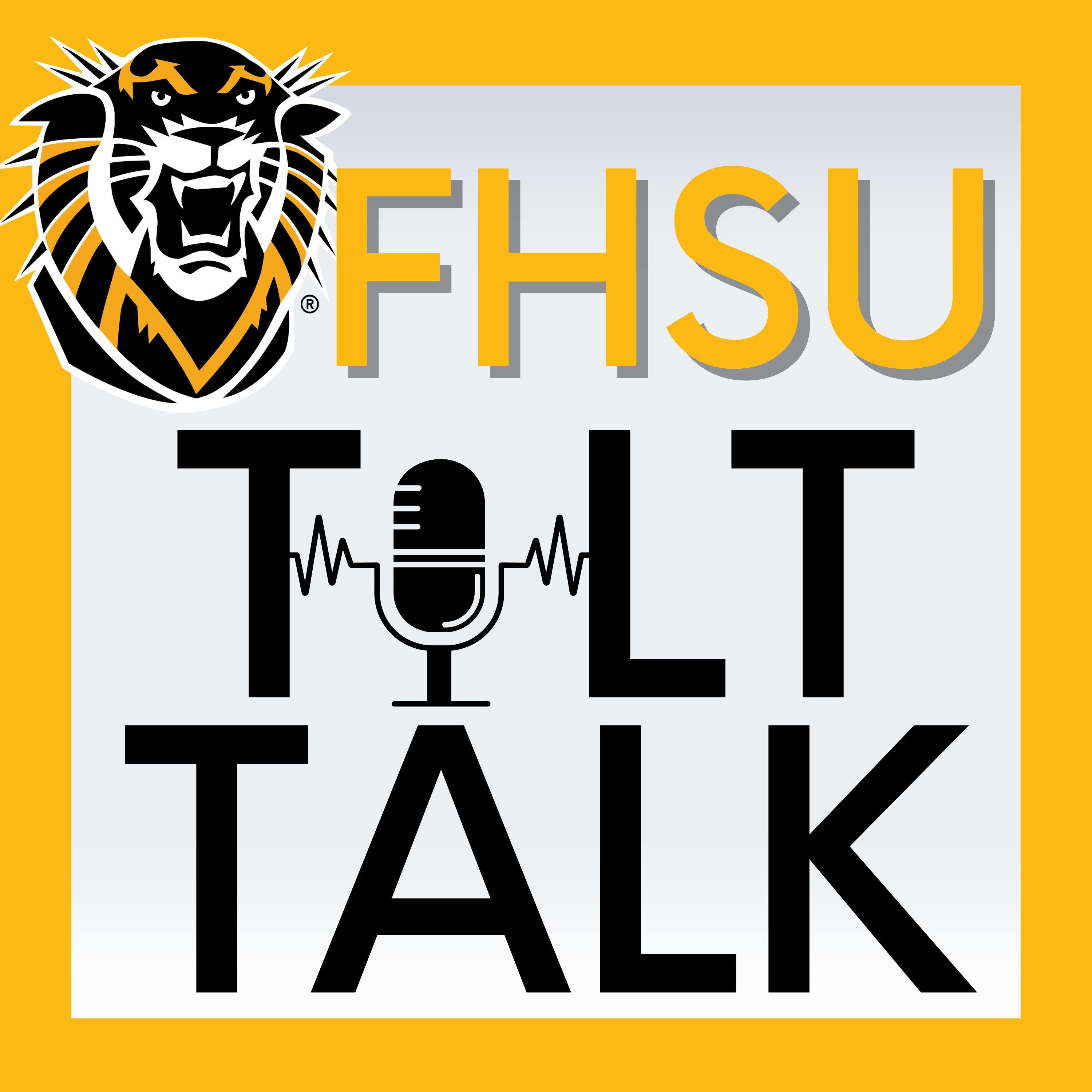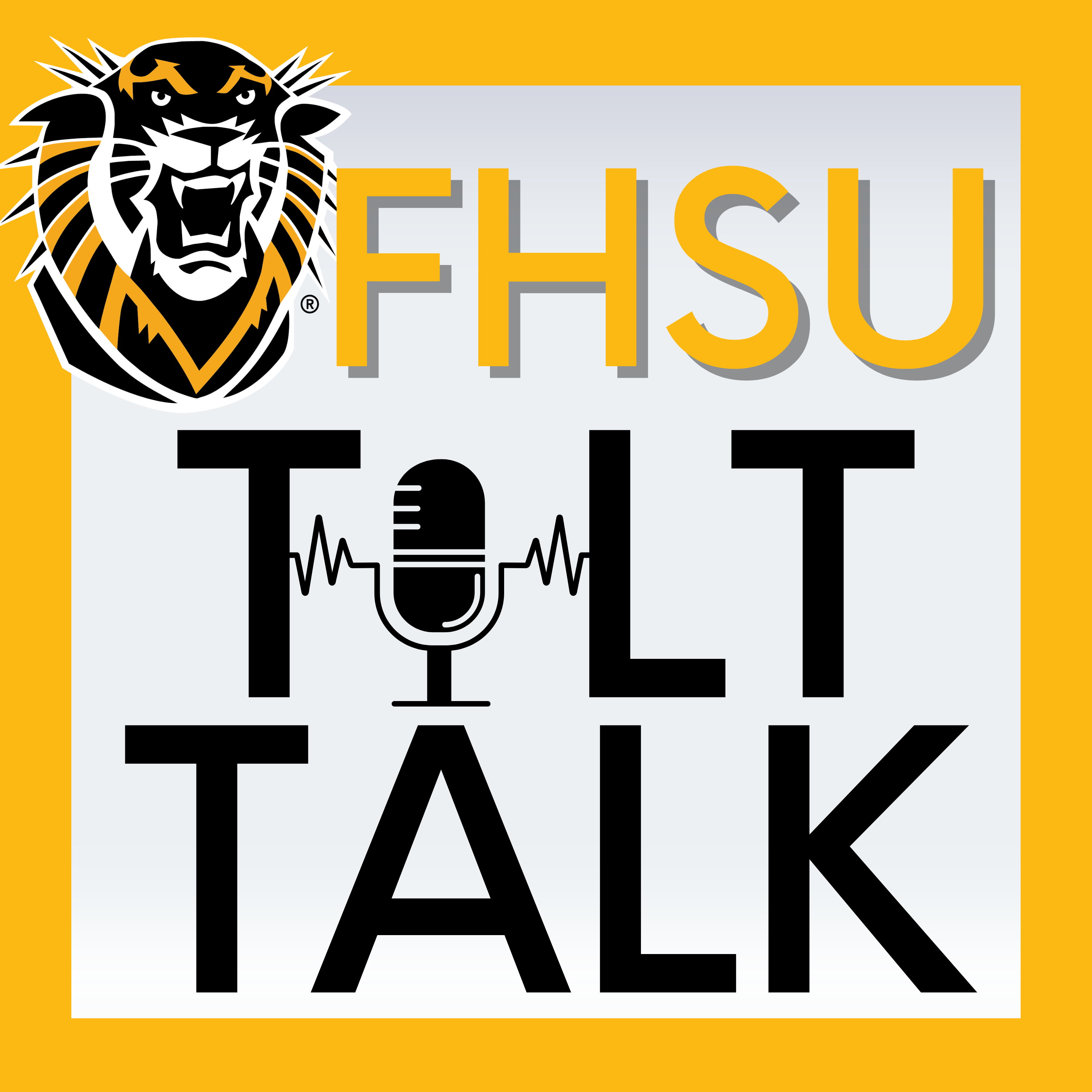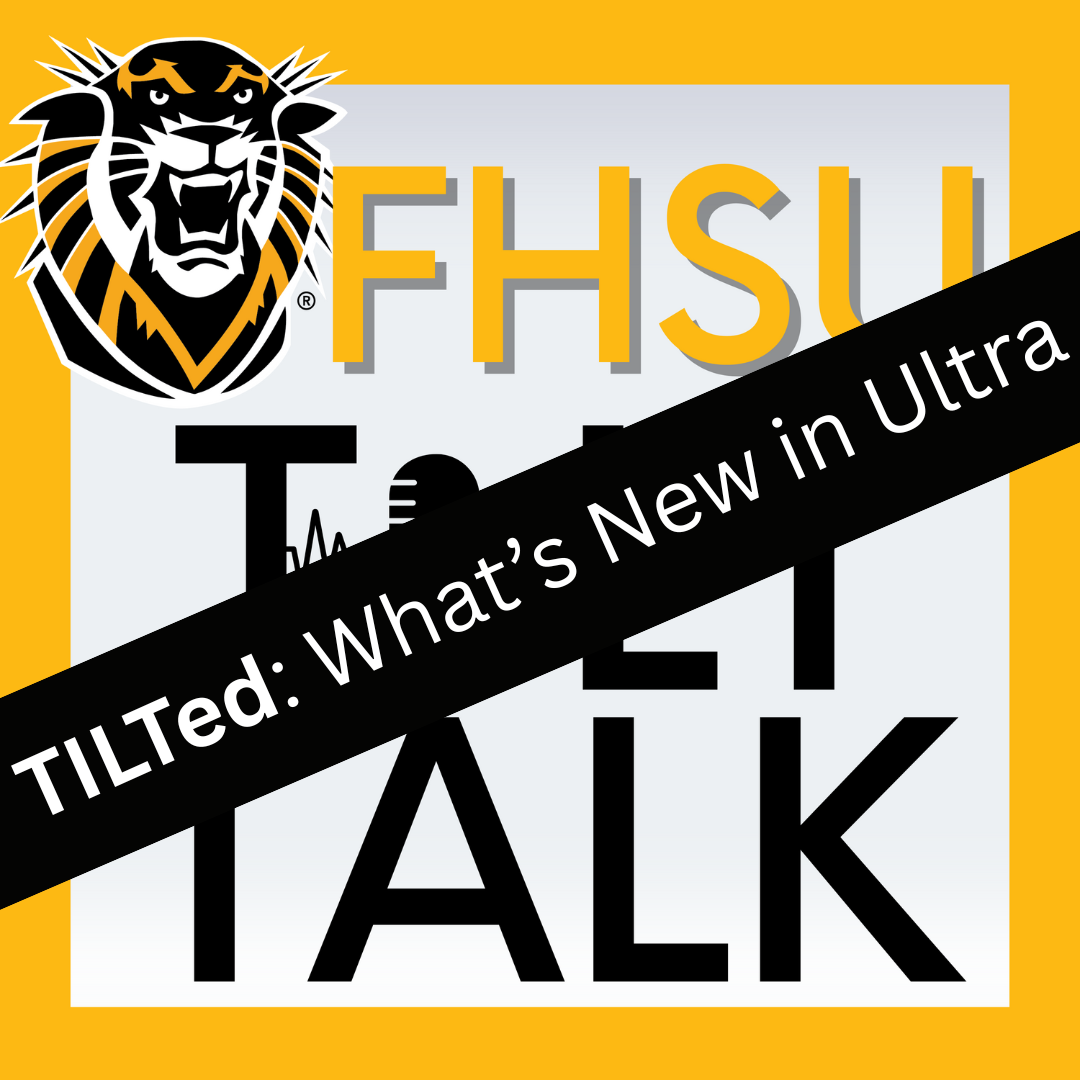Episode Transcript
[00:00:00] Speaker A: Hello everyone. Welcome to what's New in Ultra Tilted. I'm Thomas Matthews Horn from the Department of Teaching, Innovation and Learning Technologies at Fort Hays State University.
[00:00:12] Speaker B: And I'm Dani Riley, also from TILT here at fhsu. We are here with our inaugural May episode to chat about some exciting new features that just dropped in the latest Blackboard Ultra update.
[00:00:23] Speaker A: That's Right, the Blackboard 3900.116 release arrived on May 1st, and we've been exploring all the new features to share with our faculty, students and interested staff.
[00:00:37] Speaker B: And let me tell you, Thomas, there are some interesting updates that faculty will love.
[00:00:43] Speaker A: Absolutely. Today we're covering four major updates. The AI Design Assistant's new Auto Generated Conversation feature, qualitative rubrics with the no points option, a new view submission, one time test result setting, and improvements to the Learning Object repository everyone's been talking about.
[00:01:06] Speaker B: You are right. Over the last few months, the Learning Object Repository got a lot of positive feedback from instructional designers, Blackboard Ultra administrators, and faculty who have utilized it at institutions. So I'm excited to share the improvements that Anthology and the Blackboard Ultra team have already made to it.
[00:01:25] Speaker A: Let's dive right in with what the most intriguing update might be. The AI Design Assistant's new ability to auto generate elements within Ultra's engagement component, AI Conversations.
[00:01:39] Speaker B: This is such a cool feature, Thomas. For those who might not be familiar, AI Conversations allow students to interact with an AI Persona as part of their learning experience.
[00:01:48] Speaker A: Right? And they can be powerful learning tools that come in two main forms like Socratic questioning conversations that encourage critical thinking, and roleplay conversations where students can practice real world scenarios.
[00:02:02] Speaker B: But creating these conversations from scratch can be time consuming. You need to come up with a title, create an AI Persona, write reflection.
[00:02:09] Speaker A: Questions, and that's exactly what this update addresses. The AI Design Assistant can now generate three suggestions at once for these elements, giving instructors a great starting point.
[00:02:22] Speaker B: So I played around with it and it's impressive how quickly you can get a conversation up and running. The AI suggested a title, an AI Persona, and reflection questions all at once.
[00:02:33] Speaker A: It's so true. You can even upload an assignment sheet you already have and utilize it to feed the Design Assistant so that the AI is not completely missing the mark. Also, as with any other AI Design Assistant components, it's all consistent with Blackboard's AI framework, which means nothing leaves the environment and nothing is used to train any models. The best part is that instructors can refine these suggestions in several ways, right?
[00:03:01] Speaker B: Absolutely. So you can provide additional context to make the suggestions more relevant, adjust the complexity of the questions based on your students level. Select context directly from your courses, you state stated, or you can manually revise anything the AI suggests. Subject matter experts always retain control and can make changes at any time.
[00:03:21] Speaker A: I think this is going to save faculty so much time and they might use AI conversations more frequently in their courses because of it.
[00:03:29] Speaker B: That's definitely the hope. The more faculty members can embed these interactive elements, the more engaging their courses become.
Best of all, it's a native tool and no outside elements are required, which is great.
It's a default element in Blackboard Ultra. Overall, I think this is a fantastic addition that makes a powerful feature much more accessible to busy faculty.
[00:03:50] Speaker A: That's great.
Next up is a feature that many instructors have been requesting for a long time.
Qualitative rubrics with no point options.
[00:04:01] Speaker B: Yes. Not every assessment needs to be tied to numerical values, and this update finally acknowledges that.
[00:04:08] Speaker A: Exactly. Now instructors can create rubrics that focus entirely on criteria and feedback rather than points or percentages.
[00:04:16] Speaker B: This is perfect for more subjective assessments or when you want students to focus on the quality of their work rather than just the grade.
[00:04:24] Speaker A: What's really cool is that the AI generation option for rubrics now supports these no point rubrics as well.
[00:04:31] Speaker B: So not only can you create a qualitative rubric, but you also can have AI help you generate one quickly and that's a great time saver.
[00:04:38] Speaker A: Creating one of these rubrics is simple. When you're setting up a rubric, you'll now see no points as an option in the rubric type. Drop down alongside the existing percentage and point based options and you can even.
[00:04:50] Speaker B: Switch between the different types if you change your mind later. Right?
[00:04:54] Speaker A: That's right. You can edit your rubric to change from percentage to points, range, no points, or any combination.
[00:05:00] Speaker B: I think this is going to be especially useful for formative assessments where the focus is on learning and improvement rather than grading.
[00:05:08] Speaker A: Absolutely. And unlike some other features, this one is available for all Ultra courses with no configuration needed by administrators.
[00:05:15] Speaker B: That's what we like to hear. Powerful features that are ready to use right out of the box.
[00:05:20] Speaker A: Yeah.
Our third update addresses a common challenge for instructors. How to provide students with immediate feedback on tests while still maintaining test security.
[00:05:30] Speaker B: This is always a tricky balance. You want students to see what they've got, right and wrong, and so they can learn from it, but you don't want them sharing all the answers with students who haven't taken the test yet.
[00:05:41] Speaker A: Yeah. The New View Submission One Time Test Result Setting aims to solve that problem. It lets students review their answers and detailed feedback immediately after submission, but only once.
[00:05:52] Speaker B: So I guess they get the benefit of that immediate feedback, but they can't keep coming back to it to share it with others.
[00:05:58] Speaker A: Exactly. It's a great middle ground between hiding results completely and making them permanently available.
[00:06:04] Speaker B: How do instructors access this setting?
[00:06:07] Speaker A: To set it up, instructors need to go to the assessment settings and select Available after Submission in the Assessment Results section. Then they select View Submission One Time from the dropdown for customize when the submission content is visible to students.
[00:06:22] Speaker B: And that drop down is only available if allow students to view their submission is selected correct.
[00:06:28] Speaker A: That's right. It's nested under that option since it's a specific way of allowing submission viewing.
[00:06:34] Speaker B: From the student's perspective. This means they get immediate insights about their performance right after submission, but they need to make sure they have time to really review everything since they won't be able to come back to it later.
[00:06:46] Speaker A: Yes. So as instructors, we might want to make it clear to students that they should set aside enough time not just to take the test, but to thoroughly review the results afterwards.
[00:06:56] Speaker B: That's a great point. And like the qualitative rubrics, this feature is available for all Ultra courses with no configuration needed.
[00:07:03] Speaker A: These updates are really addressing some long standing pain points for both instructors and students.
[00:07:09] Speaker B: Finally, let's talk about the improvements to the Learning Object Repository that we've been introduced to recently.
[00:07:16] Speaker A: Yes, Blackboard has already enhanced it by adding a search function to the insert Object workflow.
[00:07:21] Speaker B: This is going to make a big difference for institutions that have a lot of content in their repository.
[00:07:27] Speaker A: Absolutely. Now users can search for objects by name instead of scrolling through a potentially long list.
[00:07:33] Speaker B: And the list supports retrieving more than 1,000 objects at once, which is pretty impressive.
[00:07:38] Speaker A: Plus, the list is automatically sorted in alphabetical order, making it more organized and easier to browse.
[00:07:45] Speaker B: These might seem like small tweaks, but they really enhance the workflow and make inserting objects from the repository much more efficient.
[00:07:53] Speaker A: Definitely. And for faculty listening, remember that you need permission to insert objects into courses, but this permission is turned on by default for instructors and course builders, so.
[00:08:03] Speaker B: Most of you should be able to take advantage of this improve functionality right away.
[00:08:07] Speaker A: And just to recap, the Learning Object Repository is a great place for standardized content that needs to be consistent across courses, like university policies, technology requirements, and so on.
[00:08:20] Speaker B: These improvements should make it even more useful for maintaining that consistency across courses.
[00:08:26] Speaker A: Well, that wraps up our look at the key updates and Blackboards may release.
We covered the AI design assistance, auto generation, generate conversation feature, qualitative rubrics with no points options, the view submission one time test results setting, and improvements to the Learning Object repository search function.
[00:08:47] Speaker B: As always, if faculty have questions about any of these new features, they can reach out to us at Tilt. We're here to make you make you the most Wait. We're here to help you make the most of these new tools.
[00:08:58] Speaker A: See, I think you just did that to make me feel better about messing up as well.
And for all the nitty gritty details, check out the full release notes on Blackboard's help site. We'll include a link.
These links are always available at the bottom.
[00:09:14] Speaker B: Blackboard also has weekly Ultra Open Office hours every Tuesday at 11:00am Central Time if you want to engage directly with their team.
[00:09:22] Speaker A: That's right. And don't forget that you can submit your own ideas for future Blackboard improvements through their Idea Exchange. We'll link to that as well.
[00:09:30] Speaker B: Thanks for tuning in to this month's episode of what's New in Ultra Tilted.
Don't forget to subscribe wherever you get your podcast to stay updated on all the latest Blackboard features.
[00:09:41] Speaker A: I included that in this because I think it's funny when people say that it's only going to be available here.
You can subscribe to it anywhere. You can only subscribe to it on our site. I love it. We'll be back next month with more updates. This is Thomas Matthews Horn and I'm.
[00:09:58] Speaker B: Danny Riley from TIL at Forhays State University.
See you next time.


